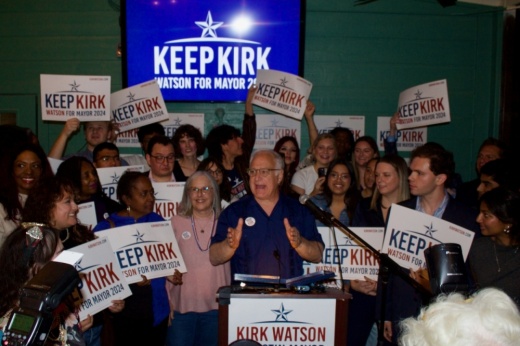As of a few minutes ago, the ballots are all counted and I’m grateful to have been re-elected to serve a full four-year term in the mayor’s office.
I’m also proud to have won by a margin of over 104,000 votes – almost 30 percentage points.
I want to thank voters for their... pic.twitter.com/DnVfTtjxTa
— Mayor Kirk Watson (@KirkPWatson) November 15, 2024
What happened
On election night Nov. 5, Watson led the five-person field in the mayoral contest by a wide margin and appeared headed for victory with a majority of the vote. However, thousands of mail-in and provisional ballots across Hays, Travis and Williamson counties had yet to be counted, leaving the election’s status unclear for over a week. Williamson County was the last to update its vote totals, a process completed late Nov. 14.
Candidates must earn 50% of the general election vote to avoid a runoff against the second-highest finisher, and early totals showed Watson with 50.01%. He held a majority with 50% after the three counties tallied their votes this month. All results are unofficial until canvassed next week.
Carmen Llanes Pulido, executive director of Go Austin/Vamos Austin, finished behind Watson with just over 20% of the vote. She's followed by educator and former council member Kathie Tovo, construction services manager Jeffery L. Bowen, and organizer Doug Greco.
In a statement, Llanes Pulido said she was waiting for the counties to confirm official results before declaring a position in the race given the slim margin for a potential runoff.
"It is misleading for the mayor to declare that he won by a margin of 104,000 votes, when in reality, he is avoiding a runoff with a margin of only 14 votes," she said. "We owe it to Austinites who have made it clear that they want new and accountable leadership, to ensure that every single vote is accurately counted and every voice is heard."
Watson narrowly avoided a runoff this year after the race two years ago required the extra head-to-head election. He defeated Celia Israel in a close December 2022 runoff, winning by less than 1,000 votes.
Zooming out
Watson will remain in office for a full four years starting in 2025 following his current two-year term, shortened by a voter-approved change to Austin’s election cycles. The city’s mayoral elections are now lined up with presidential elections and will be for a full four years going forward.
The win cements Watson as one of Austin's longest-serving mayors. On election night, he pointed to City Council actions on land-use policy, workforce, public safety as examples of “getting us back on the right track” over the past two years, and said he plans to build on that work in his second term.





